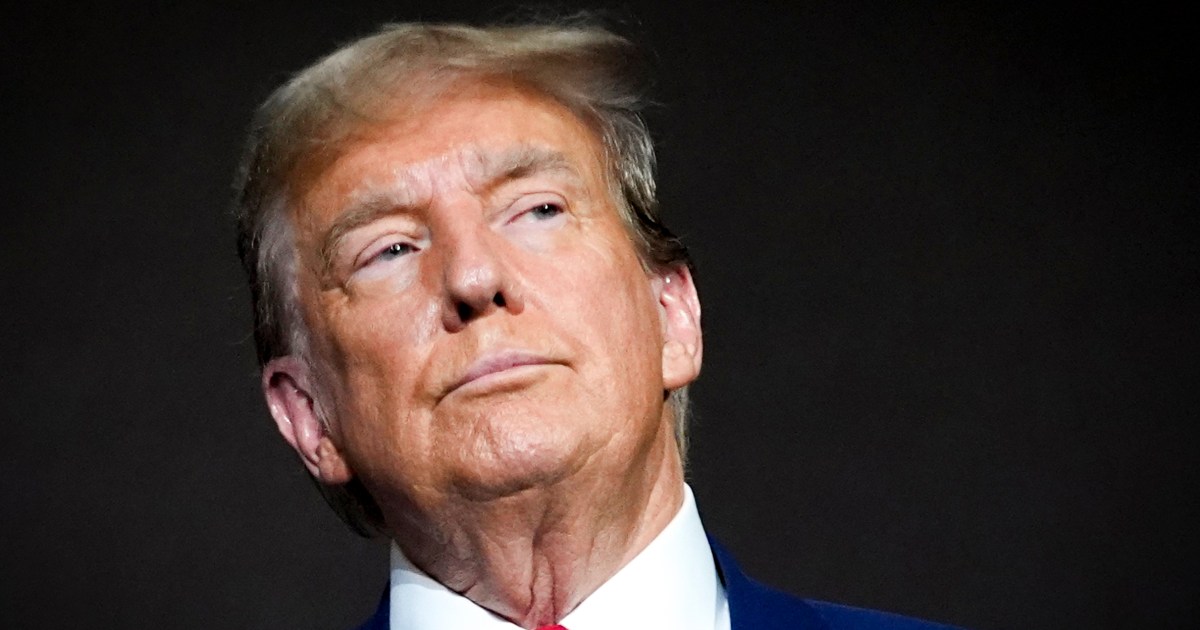By Jane C. Timm -
NBC News
State Republicans spent 2021 looking for signs of the electoral fraud that former President Donald Trump claimed cost him the groundless election.
They found no evidence.
Even so, the year was marked by a wave of voting restrictions pushed by the Republican Party (GOP) and fueled by Trump's lie - and more electoral changes are on the horizon next year, according to the Figures just released by the Brennan Center for Justice, which tracks ballot bills and advocates for federal election law.
[Senator Joe Manchin deals a fatal blow to Joe Biden's social spending plan. "It is a violation of their commitments," says the White House]
So far, Republican lawmakers in four states - Arizona, Missouri, New Hampshire and South Carolina - have previously introduced at least 13 bills that the organization says would make it difficult to vote.
Another nine states will keep 88 restrictive bills from the last legislative session.
Lawmakers from five states - Florida, Missouri, New Hampshire, South Carolina and Tennessee - have also introduced six bills to initiate or allow revisions to partisan ballots.
Four of them would initiate such reviews for the 2020 election results, according to the Brennan Center.
“There is an ongoing rumor from the former president that the election was stolen - this is an issue where state lawmakers feel pressure from Trump from above and from below who is demanding action be taken,” explained Rick Hasen, a professor. and an expert in electoral law from the University of California, Irvine.
"So this is an issue that will continue to be, unfortunately, front and center," he said.
FDA Authorizes Mailing of Abortion Pills
Dec. 17, 202100: 38
This year, 19 states, most of them controlled by Republicans, enacted 34 laws that made voting difficult, while many blue states expanded access, especially to voting by mail, according to the latest tally by the Brennan Center.
The changes unleashed bitter legislative battles and pushed big business off the margins of pressure to declare their public support for the right to vote.
"What we've seen passed this year is more than a third of all voting restrictions that have been passed in the last decade," recalled Wendy Weiser, vice president of the Brennan Center's Democracy Program, adding that the count does not fully capture the magnitude of changes due to multiple provisions included in large blanket bills.
[A federal judge dismisses Trump's lawsuit to prevent Congress from accessing his tax returns]
According to experts, the new laws will exacerbate the already significant partisan, geographic and racial differences in access to the polls.
"The way many of these voting restrictions work is by making it difficult for a subset of the electorate to vote
, which tends to be disproportionately colored and sometimes students, but they are very specific," Weiser explained.
Experts say the recent wave of restrictions has been made possible by recent Supreme Court limits on the Voting Rights Act of 1965 - in particular, the removal of the prior authorization provision that allowed the Justice Department to block discriminatory voting laws before they are implemented - a wave that could be stopped by federal voting legislation.
But in the highly divided Senate, the path to passing electoral legislation is difficult, alarming its defenders.
"Federal legislation on the right to vote is absolutely essential," said the Reverend Leah Daughtry, campaign manager for Fighting for Our Vote, a coalition of labor and civil rights organizations launched by the National Association to the Progress of Colored People (NAACP) which is pushing for the passage of federal legislation.
[Fox News anchors and even Trump's son were alarmed by the role of the former president during the assault on the Capitol]
“If the legislation is not passed, the states will take it as a permit to continue doing what they are doing by restricting people's access to the ballot, and it will be seen absolutely as a permit and as a sanction for them to continue. doing what they have already started ”.
What has happened this year
Lawmakers in 49 states drafted more than 440 restrictive voting bills in the past year, according to the Brennan Center.
Thirty-four became law.
Four states - Georgia, Iowa, Florida and Texas - passed blanket ballot bills with long lists of new and stricter restrictions.
Seven states imposed stricter voter identification requirements, while seven states shortened the deadline for requesting a vote by mail.
Four states limited the use of vote-by-mail boxes, and seven made it easy to remove citizens from voting lists.
In Texas, Democrats used parliamentary and delay measures - including fleeing the state to deny the state House of Representatives enough members to legally carry out the vote - to block the bill for months through multiple legislative sessions. .
However, the state's Republican majorities prevailed, and the governor signed the law in September.
[The White House announces $ 1.2 billion in private investments in Central America]
Some of the new laws - and much of the proposed legislation that failed last year - were intended to exert greater partisan control over electoral administration and make it easier to question future election results through partisan ballot reviews.
At the same time, there was a race to expand access to voting, especially voting by mail.
Twenty-five states enacted 62 laws that expanded access to vote in some way.
Fifteen states made voting by mail easy, while nine states made it easy to register to vote.
Six states enacted automatic voter registration.
Often times the enlargements were made in blue states.
Extensions and restrictions typically occurred in different states.
Eleven states enacted exclusively restrictive measures, while 17 states enacted expansive measures.
Why didn't Facebook run a campaign to promote the vote for Latinos?
An expert explains it
Oct. 26, 202104: 33
Eight states - Montana, New Hampshire, New York, Nevada, Indiana, Kentucky, Louisiana and Oklahoma - enacted both restrictive and expansive laws, or laws that the Brennan Center determined had both expansive and restrictive provisions.
[A publicist for Kanye West pressured an election official in Georgia to confess to bogus election fraud charges]
State Republicans have made it clear that they are willing to continue tightening the rules
.
The extraordinary partisan review of Maricopa County ballots, riddled with conspiracy theories, was promoted by Republican lawmakers who said they were trying to hunt down unproven wrongdoing to inform future legislation.
What does this all mean for 2022?
The effect of the new laws is still unknown, but there are signs that the restrictions will hurt voters.
In a recent election in Georgia, half of rejected absentee ballots missed the state's new deadline for returning ballots by mail, the Atlanta Journal-Constitution reported.
And there is some indication that the expansive measures are boosting participation by certain groups: Rutgers University professors Lisa Schur and Doug Kruse analyzed voting patterns in 2020 and found that votes cast by Americans with disabilities increased in the states. that facilitated the vote.
Still, experts cautioned that the most lasting change in American democracy is in the way people think about elections, and who runs them.
[Federal judge denies Trump's request to keep secret documents related to the robbery of the Capitol]
“The electoral system itself has become a political issue.
Even if it is not appreciably more difficult to vote in a certain place, people have the feeling that it is more difficult, ”Hasen said.
"Supporters of President Trump have been told that the last election was stolen, so they will be on the lookout for fraud," he recalled.
Weiser noted that election administrators are retiring and leaving their jobs in "droves" due to the politicization of their work, legislation designed to restrict how they do it, and the harassment 2020 brought on them.
"This is a gigantic crisis," he said.
Some contests for secretary of state next year increasingly focus on Trump's stolen election lie, too, which Hasen said could create a crisis of confidence on the left if believers in the conspiracy are elected.
"In Georgia, Republican Secretary of State Brad Raffensperger stood up to Trump and refused to manipulate the election result," Hasen explained.
"If he ends up being replaced by Jody Hice, who is running against him - a congressman who has embraced Trump's 'big lie' - it's hard to believe that Democrats are going to think he's going to run the election cleanly even if he does." concluded.









